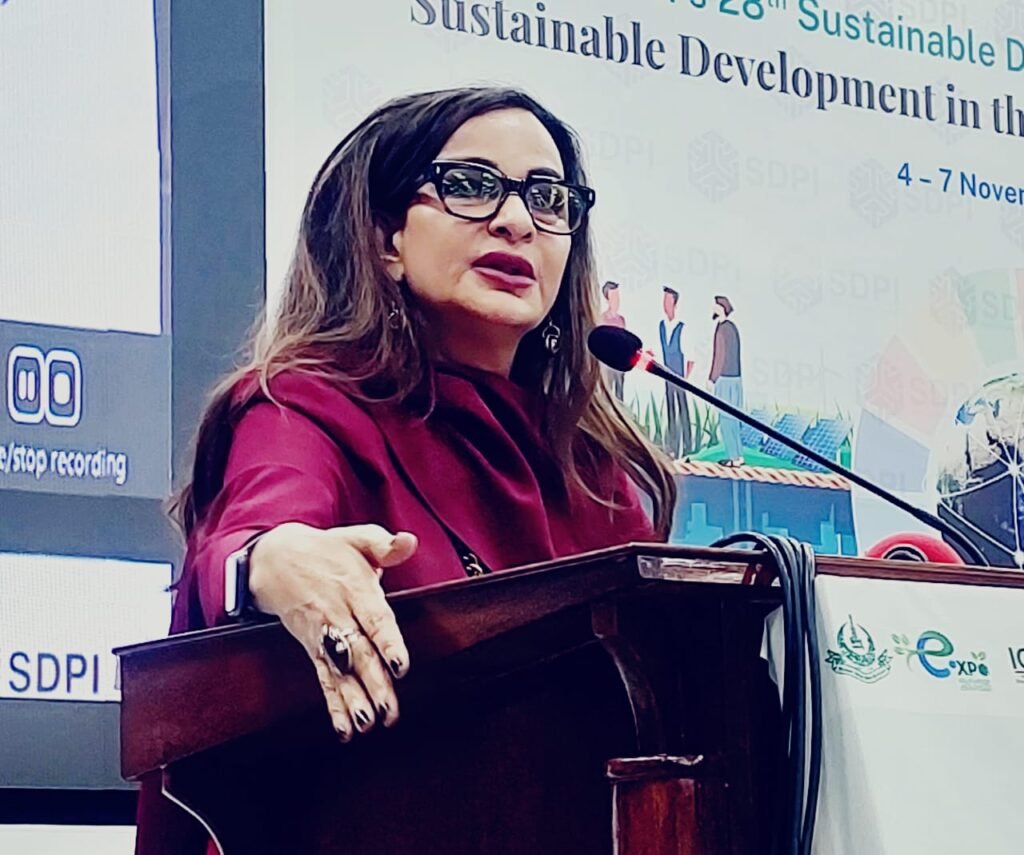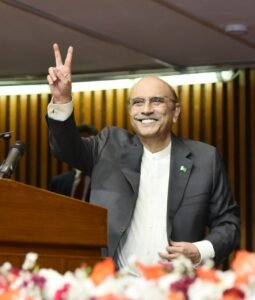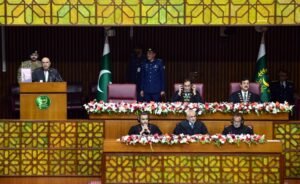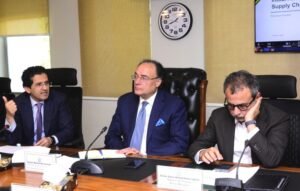
28th Sustainable Development Conference (SDC) organized by SDPI
Islamabad : Chair of Senate Standing Committee Senator Sherry Rehman, called for an urgent “debt reset” and a “Conference of Parties for Pakistan” to address the country’s escalating climate and development crises. Speaking at the 28th Sustainable Development Conference (SDC) organized by the Sustainable Development Policy Institute (SDPI), she emphasized the need for the Global North to submit Internationally Determined Contributions (IDCs) alongside Nationally Determined Contributions (NDCs) — to reflect not just emission targets but also their equity obligations toward developing countries.
She warned that Pakistan needs $348 billion by 2030 to achieve sustainability and $565 billion by 2035 for a full energy transition, yet these targets remain beyond reach without systemic reforms.
“Countries like Pakistan need a debt reset,” she asserted. “At a multilateral level, we need the IMF and MDBs to understand that debt as a form of financing is not working. It is not working for any country in this sort of resilience trap.”
Senator Rehman emphasized that climate finance has become a paradox for the Global South:
“No substantive climate financing today is without debt. Every dollar that arrives as ‘support’ comes with interest, conditionality, and a shrinking space for development sovereignty. For many of us in the Global South, this has become an impossible paradox — to borrow our way out of climate disasters we did not cause.”

She pointed out that while 40% of global carbon emissions are produced by just two countries, and 10 nations account for 75% of emissions, these same countries receive 85% of global green financing. Between 2010 and 2020, Pakistan received only $8 billion in total climate finance — 75% of it as loans.
Referring to the Preliminary Assessment of Flood Damages in the Economy of Pakistan (2025), she said:
“The report estimates total damages at Rs 822 billion, including Rs 430 billion in agriculture, Rs 307 billion in infrastructure, and Rs 92 billion in housing. Export losses exceed $450 million, while inflation rose by 5.6 percent due to food shocks.”
She called for a reform of global finance architecture to prioritize equity, concessionality, and climate justice:
“Developing countries should not be forced to borrow their way out of crises they did not create. We must ask again — where is the $300 billion promised under the New Collective Quantified Goal (NCQG)? Why must developing countries compete internationally for survival funds? Climate finance should be a right, not a race.”
Senator Rehman urged that developed nations must be held accountable for their obligations:
“In a reimagined world, developed nations would and should be submitting at COPs a corpus of Internationally Determined Contributions (IDCs) — not just for emissions, but for their equity in support to countries like ours.”
Senator Rehman warned that “the rise of political illiberalisms, hardening nationalisms, and a dangerous surge in simmering wars” have derailed global progress, triggering historic reallocations of resources. Citing figures from the recent Hague Summit, she noted that NATO countries pledged to raise defence spending to 5% of GDP by 2035, pushing global military spending to an estimated $6.6 trillion by 2035, while social and climate spending remain starved.
“This is the new global norm,” she said. “It poses an existential threat to development and climate spending, toppling all notions of equity, sustainability, and shared goals.”
Highlighting the erosion of global cooperation, Rehman observed that “the crisis of confidence in multilateralism is clear — it is struggling to protect space for development and to guardrail agreements like COP30 that need renewed vigour for collective outcomes.”
Citing the country’s debt crisis, Senator Rehman said:
“As of June, Pakistan’s public debt reached approximately $286.83 billion (₨80.6 trillion). Debt servicing consumes 46.7% of the federal budget for FY2025-26 — Rs 8.206 trillion out of Rs 17.573 trillion. Whatever fundamentals you look at, while the trade deficit grows and GDP growth remains slow, this is a problem.”
She stressed that despite years of conferences and commitments, “no reformed Global Financial Architecture has actually moved beyond the Bretton Woods orthodoxies to respond to the unique fiscal, developmental, and climate vulnerabilities of countries in special situations.”
“Despite exogenous stress, Pakistan’s current climate flows cover only 6% of our needs. Asia requires $1.11 trillion annually to adapt to climate impacts but receives only $333 billion, most of it as debt,” she added.
Addressing the issue of energy transition, Senator Rehman underscored global inconsistencies in investment priorities:
“Seven trillion dollars were given in fossil fuel subsidies per year (IMF 2022), yet it is clean energy that needs investments and subsidies. The IEA estimates that the world needs $4.5 trillion per year in clean energy investments by 2030 to stay below 1.5°C — and that is not happening.”
She noted that Pakistan has “moved on renewables on its own — a solar rush through photovoltaic imports from China,” but stressed that “fossil fuels are not being substituted; renewables are only adding energy.”
“Pakistan needs to get our house in order, defragmentize our responses, and end the cycle of endless pilot projects. We need a Conference of Parties at the national level,” she urged.
Concluding her address, Senator Rehman warned that multilateral cooperation is faltering, donor fatigue is real, and the very universality of the Sustainable Development Goals is at risk.







